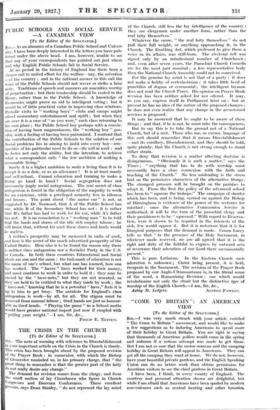FrBuc SCHOOLS AND SOCIAL SERVICE —A CANADIAN . - VIEW [To the
Editor of the SPECTATOR.] Sin,—As an alumnus of a Canadian Public School andUniver- sitv, I have been deeply interested in the letters you have pub- lished under the above head. I am, however, unable to see that any of your correspondents has pointed out just where and why English Public Schools fail in Social Service.
At no period in the history of England has there been a clearer call to united effort for the welfare—nay, the salvation --of the country ; and in the national answer to this call the voice of the Public Schools should not waver or strike a false note. Traditions of speech and manners are amenities worthy of perpetuation : but their trusteeship should be vested in the Rome, rather than in the Public School. A knowledge of Economies might prove an aid to intelligent voting ; but it would be of little practical value in improving class relations. Periodic visits to " working boys' " clubs and camps might afford momentary entertainment and uplift ; but when they are over it is a case of " as you were," each class returning to his own place ; the Public School boy perhaps with a convic- tion of having been magnanimous, the " working boy " pos- sibly with a feeling of having been patronized. I contend that the contribution of the Public Schools to the solution of our Social problems lies in aiming to instil into every boy—irre- spective of his particular need to do so—the will to work : and to foster not only the ability, but the intention, to achieve what a correspondent calls " the low ambition of making a reasonable living."
Surely it is a higher ambition to make a living than it is to accept it as a dole, or as an allowance ! It is at least manly and self-reliant. Cannot education and training to make a living go hand in hand ? Social segregation does not necessarily imply social antagonism. The real secret of class antagonism is found in the obligation of the majority to work for an existence, while a privileged minority live in idleness and luxury. The point about " the motor car " is not, as suggested by Dr. Norwood, that A of the Public School has one, while B of the Secondary School has not : it is rather that B's father has had to work for his car, while A's father has not. It is no consolation to a " working man " to be told that the lands and shares of the idle rich employ labour ; he will insist that, without his work these shares and lands would be useless.
A nation's prosperity may be measured in units of work, and here is the secret of the much advertised prosperity of the 'United States. Here also is to be found the reason why there is neither class antagonism nor a Socialist Party in the U.S. or Canada. In both these countries Educational and Social ideals are one and the same : the hall-mark of education is not the name of one's school, but what one has learned, how one has worked. The " haves " have worked for their money, and must continue to work in order to hold it ; they may be envied by the " have-nots," but they are not resented, as they are held to be entitled to what they made by work ; the " have-not," knowing that he is a potential " have," feels it is up to him to get busy. The antidote for England's class antagonism is work—by all, for all. The stigma must be removed from manual labour ; tired hands are just as honour- able as tired heads. " Playing the game " as a School motto would have greater national import just now if coupled with " pulling your weight."—I am, Sir, &c., Pnrur E. NETTEN.






































 Previous page
Previous page